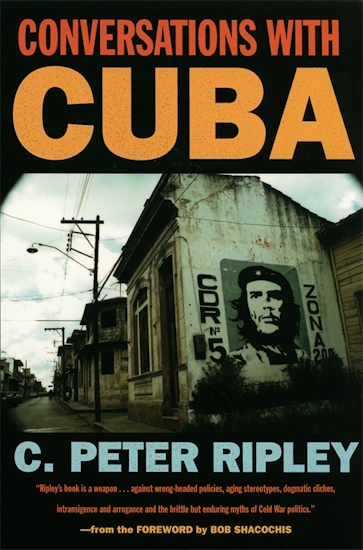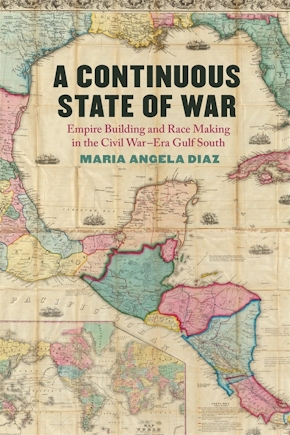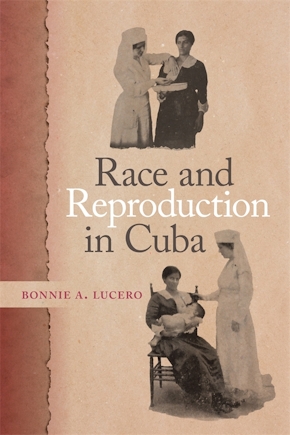Conversations with Cuba
Title Details
Pages: 272
Illustrations: 17 b&w photos
Trim size: 6.000in x 9.000in
Formats
Paperback
Pub Date: 03/26/2001
ISBN: 9-780-8203-2302-2
List Price: $34.95
Conversations with Cuba
Skip to
- Description
- Reviews
Here is a fresh story behind this passionate, struggling, frequently discouraged, but always proud country, told by ordinary Cuban citizens—the people who still struggle with a revolution that is far from over. Sparked during his high school and college years by his admiration of the Cuban revolution—the first successful bourgeois revolution of the twentieth century—C. Peter Ripley subsequently developed a fascination with Cuban culture that took him on five illegal trips to the struggling country between 1991 and 1997. During his travels, Ripley visited and revisited the Cuban landscape and its people, closely following the lives of citizens who were deeply influenced by the revolution and its effects. Through his experiences and observations, Ripley taps into the reality behind his long-romanticized perceptions of the Cuban Revolution.
Conversations with Cuba takes place during the height of the "special period," the ambiguous name given to the years of hardship following the end of the Soviet Union's vital aid to the country, isolated by the U.S.-led embargo, and preceding Cuba's as yet unrealized revitalization. Ripley guides us on a first-person journey through this bustling economy now reduced to soap shortages, one meal a day, and desperate attempts to locate an economic salvation in foreign tourism. He shows us people with a faith and pride in their nation and its revolutionary ideals that is as frequently conflicted as it is fierce. We come to know Pedro, a plumber and black marketeer; Roberto, who introduces Ripley and his companions to the enforced discrimination behind Cuban tourism; and Neddie, a schoolteacher whose early confidence in the Revolution is later seriously challenged by the harsh realities of the "special period." Ripley's most involved relationship is with Paulo, a college student turned black marketeer who becomes Ripley's guide and friend during his travels. Paulo's discontent with his country and his own circumstances is tested through the course of the book, and, guided in part by his foreign guest, he ultimately experiences a drastic transformation, trading his desire to leave Cuba for a new dedication to his heritage and a persistent hope for Cuba's revolutionary future. These individuals and countless others encountered in Conversations with Cuba reveal a moving portrait of a country and an uncommonly civil society shaped by “patria,” courage, tenacity, and a simultaneously critical and optimistic belief in their revolution, within an ambivalent reality of tension and change.
Ripley conveys the enduring strength of two Cuban traits that were apparent to perceptive viewers of more than a century ago—Cuban defiance and Cuban resilience.
—Lester D. Langley, author of America and the Americas
It is not often that a book appears possessing simultaneously the promise of lasting endurance and immediate relevance. Over the long run, Conversations with Cuba will assume a place of distinction in the vast literature produced by foreign travelers to Cuba. It is not difficult at all to anticipate the appreciation with which historians in the future will consult Ripley’s chronicle of the 1990s, for his travel memoir offers an insightful and textured representation of a people situated at the most improbable historical conjuncture. It resonates real. And precisely for the same reason, readers today with even a casual interest in the present life and times of the Cuban people would do well to give Conversations with Cuba careful consideration. Rich with intelligence and insight, the memoir provides compelling narrative form to the vitality that is Cuba today.
—Louis A. Perez Jr., University of North Carolina at Chapel Hill
Few works have captured the impact of [Cuba's economic and political changes] on citizens' everyday lives. . . . For those who cannot make the trip, Ripley's book offers a satisfying glimpse into today's Cuba.
—Times Literary Supplement
Ripley's penetrating study . . . is a hard book to put down. It is fluid in its expression and deeply personal in its love of Cuba and Cubans. . . . For anyone curious about life in Cuba today, this is the place to start.
—Tampa Tribune and Times
Uncovers the attitudes of this contradictory island country . . . [His] breezy writing style spotlights well these noble, fascinating people and their often complex story.
—Booklist
An insightful view of modern Cuba . . . [Ripley] presents a rare interpretation of life in Havana and other Cuban cities, based on firsthand observations and the opinions of free-tongued natives. . . . For those seeking a balanced view of modern Cuba from an objective reporter, Conversations with Cuba will assuredly broaden their vision.
—Mobile Register
An excellent record of how Castro's tourism policies have transformed the lives of Cubans, particularly in Havana.
—Publishers Weekly
A personal and sensitive description of the Cuban people . . . Well-written and informative.
—Library Journal



